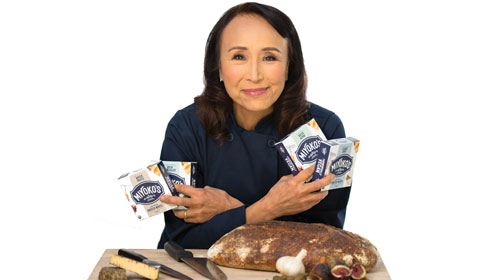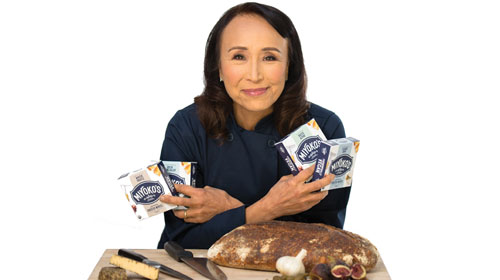 At the shipping and receiving dock of Miyoko’s, a creamery in Petaluma, pallets of cashews, coconut oil and other plant-based ingredients arrive to be turned into vegan butter, cheeses and spreads. Dairy milk is notably absent. In the employee break area, employees eat lunch from the test kitchen that produces plant-based meals for Miyoko’s staff, since no animal products are permitted on the premises. This is the future of dairies, and Miyoko Schinner is leading the charge.
At the shipping and receiving dock of Miyoko’s, a creamery in Petaluma, pallets of cashews, coconut oil and other plant-based ingredients arrive to be turned into vegan butter, cheeses and spreads. Dairy milk is notably absent. In the employee break area, employees eat lunch from the test kitchen that produces plant-based meals for Miyoko’s staff, since no animal products are permitted on the premises. This is the future of dairies, and Miyoko Schinner is leading the charge.
Her path to owning and operating a cutting-edge vegan cheese company that now distributes nationwide was first inspired by her own needs and desires. Growing up in the city of Tokyo, she was first introduced to French cuisine and gourmet cheeses in the 1980s when it was trendy in Japan. While she loved the taste of cheese, she found herself torn as she learned more about the darker side of the dairy industry and her compassion for animals compelled her to find a better alternative. By age 12, she made the decision to become vegetarian while living in the U.S. Later, when she returned to Japan in her early 20s, she made the decision to eat a plant-based diet and became a vegan chef and eventually went on to write five vegan cookbooks.
Schinner’s cookbook, Artisan Vegan Cheese, published in 2012, was about using fermentation to make plant-based cheese at home. “So I borrowed traditional cheese making techniques and applied them to plants,” she says. “I wrote the book not expecting it to do well and it became a cult classic.” While people liked the idea of making delicious-tasting vegan cheese, the time-intensive process, which can take days or even weeks, prompted many to ask her to start a business selling vegan cheese. She resisted, until Seth Tibbot, founder of The Tofurkey Company, offered to invest in the business because of the quality of her product. “That gave me the confidence,” says Schinner. “We started in Fairfax in a small 4,000-square-foot building that included both office and production space. Our so-called warehouse was actually four shipping containers out back. We’d be driving a forklift in the middle of the residential street. Neighbors hated us—they couldn’t wait to get us out of there!”
Filling a niche
What Schinner had envisioned as a quaint little vegan cheese shop in Fairfax that she started in 2014 grew rapidly. The company went live with online sales on a Friday afternoon, and by Monday morning already had $50,000 in sales. “It made me realize there is demand for this product!” says Schinner.
Miyoko’s began distributing to stores throughout the Bay Area, and then widened its distribution through Whole Foods Market. Within one year its products were available across the United States.
Today, Miyoko’s is available in approximately 12,000 stores, and notably, not just health food or natural foods markets. Its products are now available at traditional retailers such as Kroger, Target, Trader Joe’s, and Safeway. Miyoko products will also be available at Costco and Walmart later this year.
“We’ve crossed over from the natural channel to the conventional channel,” says Schinner. “We’re growing like crazy. We went from about four employees initially [about five years ago], to 112. In the beginning, we were making about 200 pounds of cheese per day and when we left [the Fairfax facility] we were making about 800 pounds a day. That is all that we could make in that little facility.”
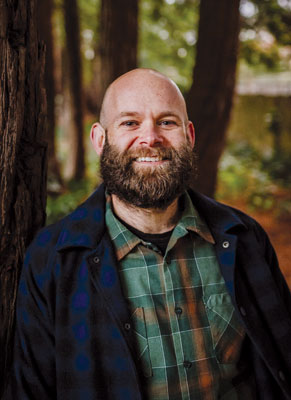 The entire company moved to its current location in Petaluma in 2017. Today, it produces about 1,500 pounds an hour, and runs two production shifts per day, followed by a graveyard cleanup shift, essentially running 24-hours a day. The facility started with one production line and quickly expanded to three to make multiple products simultaneously. “We’ve been here a year-and-a-half and we’re already bursting at the seams because of demand,” says Dan Rauch, director of R&D at Miyoko’s. “Initially we couldn’t keep up with the demand – it took some time to figure that all out – but now we are able to fulfill all orders.”
The entire company moved to its current location in Petaluma in 2017. Today, it produces about 1,500 pounds an hour, and runs two production shifts per day, followed by a graveyard cleanup shift, essentially running 24-hours a day. The facility started with one production line and quickly expanded to three to make multiple products simultaneously. “We’ve been here a year-and-a-half and we’re already bursting at the seams because of demand,” says Dan Rauch, director of R&D at Miyoko’s. “Initially we couldn’t keep up with the demand – it took some time to figure that all out – but now we are able to fulfill all orders.”
Taste the difference
While there had been vegan butters and cheeses on the market before Miyoko’s arrived, those products tended to be inferior in taste and texture, primarily being processed and mainly derived of oil and starch.
“They’re not fermented, they’re not really made like cheese,” says Schinner. “They’re made more like processed cheese and there’s definitely a place for that. But there was really no vegan cheese that you could celebrate with, that you could put on a cheese plate, or give to your omnivore friends, or serve at a party and not be embarrassed by it. That didn’t exist and we needed that. I wanted to create some high end products that could really show the world what was possible within the realm of veganism.”
Miyoko’s butter is another revelation. Other vegan alternatives on the market did not have the functionality or performance to stand in for dairy butter in certain applications. While it would do for buttering toast, it would not work as a substitute for laminated dough, for instance, such as needed for a croissant or puff pastry.
“It took a little while to catch on, but it’s our No. 1 selling SKU now,” says Schinner, about Miyoko’s fermented, vegan butter. “It performs like butter in every single way. It melts, browns, bakes like butter and it’s extremely delicious in a way that the other stuff, not to knock it, but didn’t have the full butter flavor.”
The major differentiator that sets Miyoko’s apart from other vegan dairy products is applying age-old fermentation and aging techniques to plant based ingredients. Using biology and chemistry, the dairy reaches a depth of flavor that is otherwise difficult to achieve using non-dairy products. Most of Miyoko’s products use cashews as a base, for the versatility in flavor. Cashews do not have a strong flavor on their own so the taste does not overpower a vegan dairy product, yet they have the creaminess, thickness, and fattiness that a dairy product requires.
“Cashews are akin to cow’s milk in the dairy world,” says Schinner. “It doesn’t have a very distinct flavor and is very neutral in the flavor profile, and it has the widest application. If you use goat’s milk or sheep’s milk you get a certain flavor. In my book I explored all these other substrates such as Brazil nuts, pine nuts, walnuts, oats and things like that, but they’re not as versatile. As a young company, we didn’t want to diversify our supply chain too much to the point where we incur higher costs because we’re buying smaller quantities. That’s why we stuck with cashews.”
Miyoko’s also chose cashews as the base for its products because they are an incredibly sustainable crop. They grow only in the tropics, where rainwater is the only source of irrigation and no additional water is needed for them to grow. The output volume versus amount of land required is also exponentially less in comparison to a dairy farm. One acre of land can support enough cashews to make 6,000 pounds of cheese per year. In comparison, a one-acre, organic and free-range dairy can only produce 182 pounds of traditional cheese in that time.
“We just had a life-cycle analysis done on all of our SKUs [by a third-party analyst], and compared them to dairy products,” says Schinner. “We found out that all of our products are somewhere between 10 to 53 times lower, depending on the product, in greenhouse gas emissions than their dairy counterpart. It’s powerful what you can do with plants, not only with greenhouse gas emissions but lowering the water use, land use, etc.”
That being said, with the rise in nut allergies and other dietary concerns, as well as cost-efficiencies, Miyoko’s plans to branch out in the future and is experimenting with other non-nut alternatives.
“We realize that cashews are not only expensive, but they also have a restriction in terms of allergies,” says Schinner. “Some people can’t consume it. Right now, we’re researching making cheese based on potatoes, legumes and rice. Those are also energy- and resource-efficient crops. They are healthy for the earth, adding nitrogen back to the soil. So we’re excited about launching some of those later this year.”
Not just for vegans
Interestingly, it’s not just vegans who buy Miyoko’s products—a testament to their excellent flavor. Today, an increasing number of people are adding more plant-based foods to their diets. Concerns about health, the environment and animal rights have led many to reevaluate their food choices, and, at the very least, cut down on meat and dairy products.
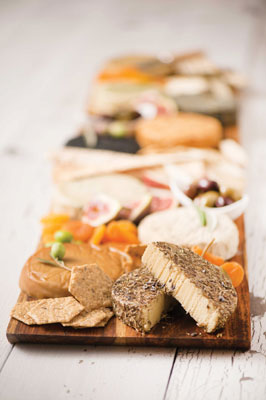 “The surveys that we’ve done online show that the majority of people that buy our products are not vegan,” says Schinner. “They’re what are called ‘flexitarians’ – people that are trying to eat lower on the food chain, trying to eat healthier once or twice a week.” While the market niche is obviously there, the rapid growth in the company has not been without its challenges. A major dilemma has been commercializing products that are new in the marketplace, with no historical data on operating procedures, equipment needed and other best practices. In addition, until moving to Petaluma, the company had been producing relatively small amounts and there was a big learning curve in increasing production to a larger scale.
“The surveys that we’ve done online show that the majority of people that buy our products are not vegan,” says Schinner. “They’re what are called ‘flexitarians’ – people that are trying to eat lower on the food chain, trying to eat healthier once or twice a week.” While the market niche is obviously there, the rapid growth in the company has not been without its challenges. A major dilemma has been commercializing products that are new in the marketplace, with no historical data on operating procedures, equipment needed and other best practices. In addition, until moving to Petaluma, the company had been producing relatively small amounts and there was a big learning curve in increasing production to a larger scale.
“This type of product had never been vetted before in terms of commercial scaling,” says Schinner. “It was one thing to make it at home, and it was another thing to make small 40-pound batches in Fairfax, which is just a slight scale up from home production where I developed all the recipes. It was a completely different thing to move to Petaluma where we were making the smallest batch size being 2,200 pounds. It was a huge operational challenge—2018 was focused on trying to commercialize our products. There were some scary moments where I didn’t know if we were going to succeed, and fortunately we have and now we know how to do it.”
Now that the company has its operational systems in place, it can teach others, which opens up the possibility of using co-packers—companies that manufacture and package foods for clients. This allows companies to expand its production beyond the walls of its own facilities. As soon as late 2019, Miyoko’s plans to move some higher volume products, such as its mozzarella and a new “tub” butter, to other co-packer facilities, freeing up space in its own production facility. “No one in America was doing this, and there was no other production facility that grinds nuts into nut milks and cream, ferments them, and packages product like we do. We had to figure out what equipment to use, and sometimes modify it for our use,” says Rauch. “Now, we are doing it very efficiently.”
Tomorrow’s creamery
On Miyoko’s products consumers see the tagline “Tomorrow’s Creamery,” though some have argued 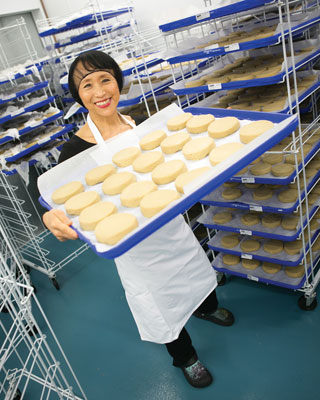 thatwith the rise of her products, tomorrow’s creamery is already here today. Schinner believes this is the future of all creameries. “We’re going to pivot in terms of our branding and talk more about the reason for the brand,” says Schinner. “It’s about compassion toward all living beings—human and non-human. That’s why the brand exists, and we’re going to talk more about that as we scale.”
thatwith the rise of her products, tomorrow’s creamery is already here today. Schinner believes this is the future of all creameries. “We’re going to pivot in terms of our branding and talk more about the reason for the brand,” says Schinner. “It’s about compassion toward all living beings—human and non-human. That’s why the brand exists, and we’re going to talk more about that as we scale.”
Schinner believes that non-dairy cheeses will catch on just as non-dairy milk alternatives have been soaring in popularity. With grocery stores selling a plethora of almond, coconut, oat, soy, and other alternative milks, as well as coffee shops offering almond milk lattes, the ubiquitous non-dairy milk alternatives point to major changes in the marketplace, and Miyoko’s is leading the charge in changing the way people think about cheese.
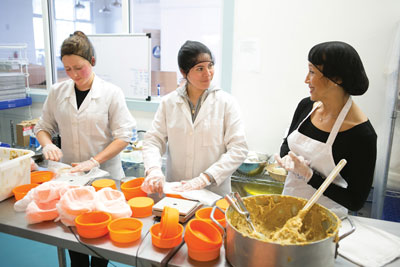 According to a 2018 report by Mintel, a global market intelligence agency, non-dairy milk sales have seen steady growth during the past five years, growing more than 60 percent since 2012 and reaching the $2.1 billion mark in 2017. “Ten years ago almond milk was a rarer thing,” says Schinner. “Now, it’s 15 percent of the food milk category. According to Cargill, by 2024 it will be 40 percent. It’s growing exponentially—it’s going to be the majority not the minority. Will animal agriculture completely come to an end? Maybe not, but I do believe that it’s going to be dramatically reduced, and partly because it’s just not sustainable.”
According to a 2018 report by Mintel, a global market intelligence agency, non-dairy milk sales have seen steady growth during the past five years, growing more than 60 percent since 2012 and reaching the $2.1 billion mark in 2017. “Ten years ago almond milk was a rarer thing,” says Schinner. “Now, it’s 15 percent of the food milk category. According to Cargill, by 2024 it will be 40 percent. It’s growing exponentially—it’s going to be the majority not the minority. Will animal agriculture completely come to an end? Maybe not, but I do believe that it’s going to be dramatically reduced, and partly because it’s just not sustainable.”
With our ever-rising global population, as well as the subsequent environmental disasters including climate change, the devastation of rainforests and other habitats, and the extinction of species, Schinner believes that eating plant-based is the future. According to research done by University of Minnesota’s Institute on the Environment, just 55 percent of the world’s crop calories are actually eaten directly by people. In the United States, only 27 percent of crop calories are consumed directly. More than 67 percent of crops go to animal feed, and a portion of the rest go to ethanol and other biofuels.
“Studies after studies show that we could reduce global farmland by 76 percent, and food-related global greenhouse gas emissions by 73 percent, if we switch to a plant-based diet,” says Schinner. “With the warnings put out by the United Nations and others, there isn’t that much time left to actually do something to reverse climate change and the decimation of species. We’ve seen more species extinction in the last 50 years than we have in all of human history. People are unaware of the magnitude of the problem and that the power is in their hands. The trickle effect of saving all life is incredible, as well as saving the planet, and it’s in the hands of all consumers.”
Changing the game
Schinner is quick to point out, however, that Miyoko’s is not the enemy of animal agriculture and is sensitive to the issues and challenges facing dairy farmers today. With decreasing milk prices, farmers are often in debt over their heads and proponents of the plant-based movement are seen as the enemy, when in fact consumer trends have been changing since the 1970s when milk consumption first started decreasing. She hopes that farmers and other players in the dairy industry can see the plant-based movement as a burgeoning business opportunity—a new way to play the food-business game.
“We could also be seen as the solution, not the threat. If you have large tracts of land, if you have processing facilities why not jump on the bandwagon and help advance the plant-based movement,” says Schinner. “If you have land, you can grow potatoes or legumes for the cheeses that we’re going to make. Or, if you have a processing facility you can turn it into a plant based dairy facility.”
One dairy in New York, Elmhurst, did just that. The 90-year-old dairy company closed in 2016 due to the steady decline in dairy consumption. Henry Schwartz, chief executive officer at Elmhurst, decided to reinvent the company as a plant-milk producer in 2017. Today, Elmhurst is doing financially better than ever and is the fastest growing plant-based beverage company on the market. “You can look at it as an exciting opportunity to shift, but there does have to be a mind-set change,” says Schinner. “There are a lot of wonderful possibilities out there for current dairy farmers who are struggling. We’d love to help.”
While Schinner is proud to be a game changer, leader, and trailblazer in this new, growing category of food, she nevertheless is not only willing, but hoping, to share the spotlight with others wanting to enter the marketplace and expand this market niche. The more people and companies experiment and invest in more sustainable food choice categories, the better it is for consumers, the planet, and the products themselves, as they expand in options and taste. Just as the beginning stages of alternative milks were almost unpalatable 30 years ago, so to will other alternative dairy products become better over time.
“Initially, vegan cheese was the laughing stock of the natural foods world because it was so terrible,” says Schinner. “But it’s getting better. The whole industry is going to change as makers become better. This is a new category. Vegan cheese just hit the marketplace a short time ago, and people are just beginning to elevate it. I’m proud we’ve helped. We paved the way, and I hope a lot of people will join in the pursuit of making these products better and better. We’re not going to change the category unless everybody holds hands and grows it together.”
Rancho Compasión
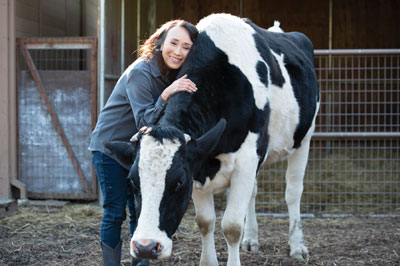 Upon entering Rancho Compasión, a farm animal sanctuary, goats, pigs, and geese alike run up to sniff out visitors and say hello. Oliver the pig happily grunts along, seemingly unaware that he narrowly escaped the fate of being auctioned off as a luau pig at an equine fundraiser by being bid on by a good Samaritan who wanted to spare him that demise. Angel the cow, who according to Miyoko Schinner became a diva on the ranch after becoming an Internet sensation when a YouTube video of her falling asleep on someone’s lap went viral, slowly lumbers along, looking for her best friend on the ranch, a goose.
Upon entering Rancho Compasión, a farm animal sanctuary, goats, pigs, and geese alike run up to sniff out visitors and say hello. Oliver the pig happily grunts along, seemingly unaware that he narrowly escaped the fate of being auctioned off as a luau pig at an equine fundraiser by being bid on by a good Samaritan who wanted to spare him that demise. Angel the cow, who according to Miyoko Schinner became a diva on the ranch after becoming an Internet sensation when a YouTube video of her falling asleep on someone’s lap went viral, slowly lumbers along, looking for her best friend on the ranch, a goose.
It’s only fitting that an entrepreneur whose motto is compassion towards all living beings would start a sanctuary for previously neglected, exploited and abused farm animals, but it started quite by accident.
“It started in 2015, not on purpose,” says Schinner. “We moved out to Nicasio and somebody asked us to take some goats that were strays and we did because we had a barn. And then someone asked us to take some pot-bellied pigs which we did, and then someone asked us to take a sheep and a goat, and the next thing we knew, we said ‘let’s do this.’”
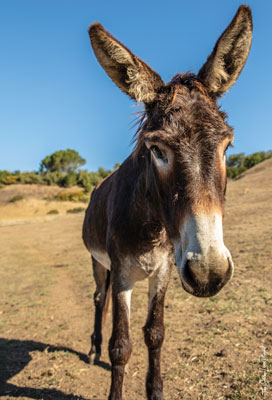 In true Miyoko’s fashion, Schinner jumped all in, forming the sanctuary into a 501(c)3 nonprofit and taking in more rescued farmed animals that needed a forever home. Named Rancho Compasión, Spanish for "compassion ranch," it has since provided a safe haven for more than 70 animals, including turkeys, geese, ducks, chickens, cows, goats, pigs, donkeys and sheep. Its mission is to provide shelter and care for rescued farm animals for their entire natural lifespans, and to educate visitors and students to help them rethink how they view animals typically categorized as “food.” Rancho Compasión promotes and advocates for a vegan lifestyle for the animals, for our planet and for our health. To help fulfill its mission, the sanctuary regularly holds visitation days for the public, volunteer days, school field trips, and other events.
In true Miyoko’s fashion, Schinner jumped all in, forming the sanctuary into a 501(c)3 nonprofit and taking in more rescued farmed animals that needed a forever home. Named Rancho Compasión, Spanish for "compassion ranch," it has since provided a safe haven for more than 70 animals, including turkeys, geese, ducks, chickens, cows, goats, pigs, donkeys and sheep. Its mission is to provide shelter and care for rescued farm animals for their entire natural lifespans, and to educate visitors and students to help them rethink how they view animals typically categorized as “food.” Rancho Compasión promotes and advocates for a vegan lifestyle for the animals, for our planet and for our health. To help fulfill its mission, the sanctuary regularly holds visitation days for the public, volunteer days, school field trips, and other events.
“I’m hoping when I can afford it, to buy more land and expand the sanctuary and make it a real humane education center,” says Schinner. “That’s what we’re striving for now. We love it when we have school field trips here. We have a whole program that involves videos, lectures, working and visiting with the animals and connecting people to animals.”
While most of the animals come from local areas, some were sent to the sanctuary from across 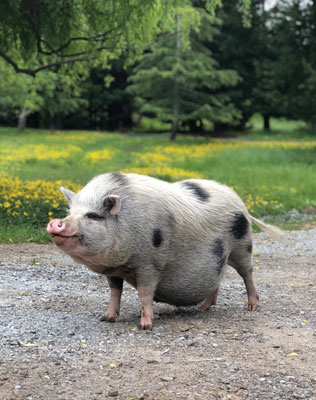 California, and as far away as Louisiana in the case of two donkeys, destined for a kill shelter. Others were animals raised by Future Farmers of America to be sold for slaughter at county fairs. Some of the children could not give their animals up to that fate.
California, and as far away as Louisiana in the case of two donkeys, destined for a kill shelter. Others were animals raised by Future Farmers of America to be sold for slaughter at county fairs. Some of the children could not give their animals up to that fate.
“Many of the animals come from Sonoma County,” says Schinner. “We have pigs from FFA and a cow from an FFA situation, a former dairy cow, donkeys from a kill lot, geese that were rescued and found running along Sunset Boulevard in Hollywood. They come from all different walks of life, but they’re all happy here, living their lives as they see fit. People love coming here and seeing their personalities and seeing what animals are like when they’re given freedom to express themselves.”


